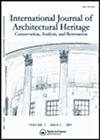日本保护历史街区/村落基于居住条件和社区特征的防灾规划防火措施
IF 2.4
3区 工程技术
0 ARCHITECTURE
International Journal of Architectural Heritage
Pub Date : 2023-11-07
DOI:10.1080/15583058.2023.2276177
引用次数: 0
摘要
【摘要】东亚地区的许多历史街区/村庄都密集建造了传统的木结构建筑,这些建筑不具有抗灾能力,容易受到火灾的影响,发生大规模火灾的风险很高。特别是在日本,历史街区/村庄的类型因其所在位置的不同而不同。除了火灾的高风险外,近年来,随着人口老龄化,空置房屋和只有老年人居住的家庭数量增加,导致火灾检测延迟的风险增加,火灾响应能力下降。在这项研究中,我们关注的是日本保存的商业和波浪工业历史街区和一个历史山村。通过对居民的多次问卷调查和访谈调查,我们研究了使用火灾信号共享系统通过与邻居共享火灾信号来控制火灾损失,从而在早期发现和发现火灾,并通过居民之间的互助及早扑灭火灾。因此,在被调查的历史街区/村落中,基于对建筑实际居住情况和使用情况的了解,发现在一定时期内,由于该地区/村落人口的减少和建筑使用方式的变化,很难在早期发现和应对火灾。然后,通过分析居民对邻里关系、居民发生灾害时的互助意识、居民的邻里互动程度、居民的合作感知水平的问卷调查结果,明确邻里关系密切、邻里互动程度高的居民往往具有较高的合作感知水平,并会采取各种合作响应行动,直至初步灭火。通过对已设置火灾信号共享系统作为防火措施的历史保护街区的调查结果分析,发现在火灾信号共享系统触发时,实际采取与火灾早期应对相关的互助行动的居民具有高度的互动性,特别是在高山三町发生火灾的早期阶段,居民的合作被认为是有效控制火灾损失的。关键词:防火措施火灾信号共享系统互助早期火灾响应系统邻里关系历史街区/村落居民互动程度火灾发生时居民的合作感知感谢高山市教育委员会和岐阜县高山三町历史保护街区、Kiryu市政厅和群马县Kiryu新町历史保护街区的居民。以及会津市教育委员会和静冈县花泽保护的历史村庄,感谢他们合作开展这项研究。披露声明作者未报告潜在的利益冲突。注1:自江户时代中期以来,这是一个维护和管理“Yatais”的当地社区。“Yatais”是一种具有历史意义的花车,每年都会在节日期间拉来展示它是在保护区的三个街区中各形成一个地方社区,开展城镇景观保护活动等。3是在每个城镇景观保护协会中设立一个地方社区,负责初期消防等防灾活动。本文章由计算机程序翻译,如有差异,请以英文原文为准。
A Fire Prevention Measure for Disaster Prevention Planning Based on Resident Conditions and Community Characteristics in Preserved Historic Districts/Village in Japan
ABSTRACTMany historic districts/villages in East Asia are densely built with traditional wooden structures that are not resistant to disasters, making them vulnerable to fire and at high risk of large-scale fires. Particularly in Japan, the types of historic districts/villages vary in terms of how they were formed based on where they are located. In addition to the high risk of fire, in recent years, with the aging of the population, there has been a rise in the number of vacant houses and households with only elderly residents, which has led to an increase in the risk of delayed fire detection and reduced fire response capabilities. In this study, we focus on preserved commercial and waving industrial historic districts and a historic mountain village in Japan. Through multiple questionnaires and interview surveys with residents, we examine the use of a fire signal sharing system to control fire damage by sharing fire signals with neighbors to detect and discover fires at a very early stage and extinguish fires early by mutual assistance among residents. As a result, in the surveyed historic districts/village, based on the understanding of the actual living situations and use of buildings, it is revealed that it is difficult to discover and respond to fires at an early stage during certain time periods due to a decline in population in the district/village and changes in building use. Then, through analyzing resident questionnaire results on neighborhood relations and resident awareness of mutual assistance in the event of a disaster, residents’ degree of neighborhood interaction and level of cooperation perception, it is clarified that residents with close neighborhood relations and high degrees of neighborhood interaction tend to have high levels of cooperation perception and will take various cooperative response actions to the extent of initial fire extinguishing. Based on the analysis of the survey results conducted in the preserved historic districts where a fire signal sharing system has already been installed as a fire prevention measure, it is found that the residents who actually took mutual-aid actions related to early fire response when the system was triggered had high degrees of interaction, and especially the resident cooperation during an early stage fire in Takayama Sanmachi is considered to be effective in controlling fire damage.KEYWORDS: Fire prevention measurefire signal sharing systemmutual-aid early fire response systemneighborhood relationspreserved historic districts/villagesresidents’ interaction degreeresidents’ perception of cooperation in times of fire AcknowledgmentsWe are deeply grateful to the Takayama City Board of Education and the residents of the Takayama Sanmachi preserved historic district in Gifu Prefecture, Kiryu City Hall and the Kiryu Shinmachi preserved historic district in Gunma Prefecture, as well as the Yaizu City Board of Education and the Hanazawa preserved historic village in Shizuoka Prefecture for their cooperation in conducting this research.Disclosure statementNo potential conflict of interest was reported by the author(s).Notes1 It is a local community that has maintained and managed “Yatais”, historic floats that are pulled and demonstrated during annual festival since the mid-Edo period.2 It is a local community formed in each of the three blocks in the preserved district to conduct townscape preservation activities, etc.3 It is a local community that is set up in each townscape preservation association and is responsible for initial firefighting and other disaster prevention activities.
求助全文
通过发布文献求助,成功后即可免费获取论文全文。
去求助
来源期刊
CiteScore
7.20
自引率
12.50%
发文量
76
审稿时长
>12 weeks
期刊介绍:
International Journal of Architectural Heritage provides a multidisciplinary scientific overview of existing resources and modern technologies useful for the study and repair of historical buildings and other structures. The journal will include information on history, methodology, materials, survey, inspection, non-destructive testing, analysis, diagnosis, remedial measures, and strengthening techniques.
Preservation of the architectural heritage is considered a fundamental issue in the life of modern societies. In addition to their historical interest, cultural heritage buildings are valuable because they contribute significantly to the economy by providing key attractions in a context where tourism and leisure are major industries in the 3rd millennium. The need of preserving historical constructions is thus not only a cultural requirement, but also an economical and developmental demand.
The study of historical buildings and other structures must be undertaken from an approach based on the use of modern technologies and science. The final aim must be to select and adequately manage the possible technical means needed to attain the required understanding of the morphology and the structural behavior of the construction and to characterize its repair needs. Modern requirements for an intervention include reversibility, unobtrusiveness, minimum repair, and respect of the original construction, as well as the obvious functional and structural requirements. Restoration operations complying with these principles require a scientific, multidisciplinary approach that comprehends historical understanding, modern non-destructive inspection techniques, and advanced experimental and computer methods of analysis.

 求助内容:
求助内容: 应助结果提醒方式:
应助结果提醒方式:


